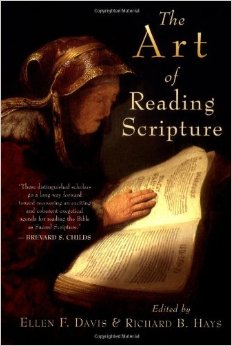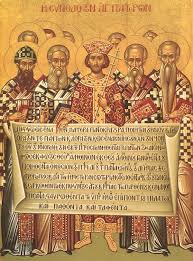A Hermeneutical Journey: The Art of Reading Scripture
 On a more personal note, I feel like I've been on a hermeneutical journey for the past 10 years. I can look back and see different attitudes that I've had about scripture, different influences to approach Scripture, historical and ecclesial models, and more. Some approaches to Scripture have had mechanistic approaches to master the single meaning of the text, whereas others consisted of less structured multivalent communal readings.
However, over the past number of years, the Church Fathers have influenced my hermeneutics more than any given grammatical method. They read the Scriptures theologically and historically, in tradition, individually and communally, and model a chance to meet the divine in the whole of Scripture. Theological Interpretation of Scripture, as a postmodern endeavor, has helped this move by giving a broader reading framework and more viability to Patristic exegesis, as well as Medieval, Reformation, and post-modern readings of Scripture.
On a more personal note, I feel like I've been on a hermeneutical journey for the past 10 years. I can look back and see different attitudes that I've had about scripture, different influences to approach Scripture, historical and ecclesial models, and more. Some approaches to Scripture have had mechanistic approaches to master the single meaning of the text, whereas others consisted of less structured multivalent communal readings.
However, over the past number of years, the Church Fathers have influenced my hermeneutics more than any given grammatical method. They read the Scriptures theologically and historically, in tradition, individually and communally, and model a chance to meet the divine in the whole of Scripture. Theological Interpretation of Scripture, as a postmodern endeavor, has helped this move by giving a broader reading framework and more viability to Patristic exegesis, as well as Medieval, Reformation, and post-modern readings of Scripture.
In The Art of Reading Scripture, edited by Ellen F. Davis & Richard B. Hays, there are multiple chapters on theological, historical, and critical readings of the Bible. After the final product of the book, 9 theses emerged to offer theological readings of the Scriptures. I find the following 9 theses helpful, even helping solidify my own hermeneutical journey.
- Scripture truthfully tells the story of God's action of creating, judging, and saving the world.
- Scripture is rightly understood insight of the church's rule of faith as a coherent dramatic narrative.
- Faithful interpretation of Scripture requires an engagement with the entire narrative: the New Testament cannot be rightly understood apart from the Old, nor can the Old be rightly understood apart from the New.
- Texts of Scripture do not have a single meaning limited to the intent of the original author In accord with Jewish and Christian traditions, we affirm that Scripture has multiple complex senses given by God, the author of the whole drama.
- The four canonical Gospels narrate the truth about Jesus.
- Faithful interpretation of Scripture invites and presupposes participation in the community brought into being by God's redemptive actions — the church.
- The saints of the church provide guidance in how to interpret and perform Scripture.
- Christians need to read the Bible in dialogue with diverse others outside the church.
- We live in the tension between the "already" and the "not yet" of the kingdom of God; consequently, Scripture calls the church to ongoing discernment, to continually fresh rereading of the text in light of the Holy Spirit's ongoing work in the world.



